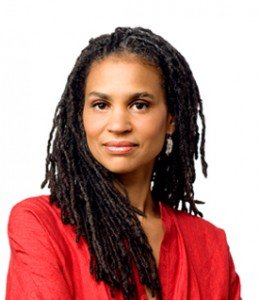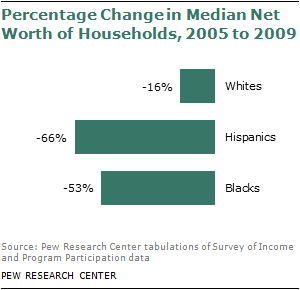
Our Community
 Editor’s note: This post comes from Maya Wiley, Executive Director of the Center for Social Inclusion (a project of Tides) and the chair of Tides’ Board of Directors.
Editor’s note: This post comes from Maya Wiley, Executive Director of the Center for Social Inclusion (a project of Tides) and the chair of Tides’ Board of Directors.
The recession that was supposed to have ended in 2009 has become a depression for many communities of color. The Pew Research Center’s astounding report “Wealth Gaps Rise to Record Highs Between Whites, Blacks, Hispanics” is the most recent to draw this conclusion. Consider it’s findings. The median wealth of white households is 20 times that of black households and 18 times that of Hispanic households. From 2005 to 2009, inflation-adjusted median wealth fell by 66% among Hispanic households and 53% among black households, compared with just 16% among white households. This is the biggest racial wealth divide this country has seen in the past 25 years. This wasn’t the first news story to highlight the problem. Just a few weeks ago, Jesse Washington’s Associated Press article on the shrinking Black middle class was carried in every major newspaper in the country. Both stories highlight the racialized impact of subprime lending and the mortgage foreclosure crisis. Washington’s article on the shrinking Black middle class also noted that while America was slowly going back to work, with unemployment rates dropping from 9.4 to 9.1%, Black unemployment jumped from 14% to 16.2% during the same period.
 Unfortunately, for communities of color, there are far too many statistics on declining wealth, increasing poverty, and exclusion to list in a blog. The question these stories and the statistics should force us to ask ourselves is what does this say about race in America and how do we respond? It tells us that, despite the tremendous progress we have made to address racial inequality in this country, race continues to be relevant in today’s society. We are literally watching the gains of the civil rights era be eroded by a misplaced demand for “colorblindness.” While we want race to disappear as a marker of class, political, and social position in this country, we do not want to blind ourselves to the mistakes and misinvestments that relegate whole groups to poverty and exclusion.
Unfortunately, for communities of color, there are far too many statistics on declining wealth, increasing poverty, and exclusion to list in a blog. The question these stories and the statistics should force us to ask ourselves is what does this say about race in America and how do we respond? It tells us that, despite the tremendous progress we have made to address racial inequality in this country, race continues to be relevant in today’s society. We are literally watching the gains of the civil rights era be eroded by a misplaced demand for “colorblindness.” While we want race to disappear as a marker of class, political, and social position in this country, we do not want to blind ourselves to the mistakes and misinvestments that relegate whole groups to poverty and exclusion.
We can’t understand race’s relevance in terms of traditional racism, although we still have more of that than any of us would like. We have to understand it as a policy-driven opportunity gap. For example, home ownership was the 20th century strategy to wealth-building for working class America, but discriminated against people of color – mortgage insurance redlining, irrational decisions by banking institutions, and lack of credit history plagued many communities of color. In 1996 Congress gutted the Community Reinvestment Act, one of the few policy vehicles aimed at creating incentives for banks to do business in communities of color. We also failed to regulate the secondary mortgage market. So, blacks and latinos were over-represented in the sub-prime mortgage market, even when they were prime rate eligible. A New York Times article found that blacks earning $350,000 a year were more likely to have a subprime loan than whites earning $50,000 a year. Blacks and latinos are 6 times more likely to depend on public transit, yet we spent billions on highways. Transit can get transit riders to jobs. It can also create jobs driving and servicing public transit. People of color get those jobs.
The good news is that there are solutions. If we can muster the moral courage and political will to declare race all too relevant today we have an opportunity for a new discussion about affordable housing in opportunity-rich neighborhoods. We have the space to fully consider that we put more public dollars into public transit that creates environmentally friendly, living wage jobs that people of color get, as well as whites. And perhaps we even recognize that we must raise the debt ceiling and invest in the programs that support solutions in communities that are fast becoming the majority of our nation’s people.
Maya Wiley is the founder and Director of the Center for Social Inclusion (CSI), an applied research and advocacy organization which supports community groups to dismantle structural racism. As a civil rights attorney and social justice advocate by trade, she has worked for the ACLU, the NAACP Legal Defense & Educational Fund and the United States Attorney’s Office for the Southern District of New York. Maya also served as an advisor to the Open Society Institute and as a consultant to the Open Society Foundation. Wiley also served as a panelist at the kick-off Tides Learning Community event Harvest of Empire: Community Briefing on Immigration in June 2011.
Header image via the Center for Social Inclusion.

Read the stories and hear the voices of social change leaders fighting for justice.